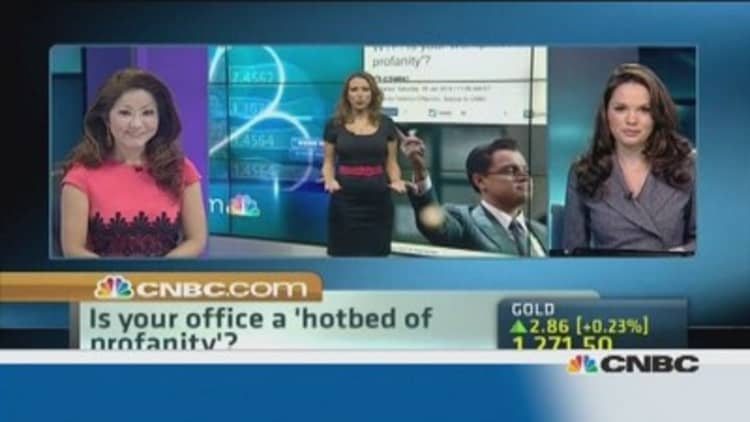
Does profanity belong in the modern workplace? Hell, yes, say some business insiders.
"Wall Street is a hotbed of profanity," said Dennis Gibb, a former trader at Morgan Stanley and junior partner at Bear Stearns. "You've got a lot of high-testosterone people with big egos making a lot of money. When you've just bought 100,000 shares of something, profanity is a pretty appropriate response."
Profanity reigns supreme in Director Martin Scorsese's latest movie, "The Wolf of Wall Street." Setting a record for f-bombs—506 by most counts—the film's portrayal is exaggerated, but only slightly, according to Gibb, now vice president of Sweetwater Investments in Redmond, Wash.
(Read more: 25 craziest job interview questions)
Swearing, especially when combined with humor, is an essential de-stressor in a pressurized work environment, he added.
"I spent 10 years in the Army. It's the same thing [as high-stakes commerce]—someone's trying to kill you," said Gibb. "I can swear now in 17 languages."
(Read only: )
In fact, vulgar language seems to be the rule rather than the exception at many jobs these days, according to some employees. Though the practice is often attributed to the influence of popular culture, some people curse more than others at work—particularly office alphas.
"People sometimes use [profanity] as a weapon," Gibb acknowledged. "It's a way of trying to show dominance, like gorillas beating their chests."
Timothy Jay, a professor of psychology at the Massachusetts College of Liberal Arts and an authority on swearing, has found that extroverted, Type A personalities can be more inclined to use strong language at work. "Some personality factors are associated with the motivation to use curse words, such as impulsivity and masculinity," Jay wrote in a paper. "These kinds of people have difficulty restraining their use of curse words; they use curse words to achieve personal states or effects (e.g., for stress reduction) and to affect others (e.g., for bullying)."
Melissa Mohr, author of "Holy Sh*t, a Brief History of Swearing," concurs, pointing out that forceful, taboo language historically has been associated with powerful men.
"People have always sworn when they've hurt themselves, when they're angry, when they're happy," she said. "But when it looks like aggression, it can be a dominant display. Swearing is a sign that the speaker is emotionally aroused."
(Read more: In Singapore? Odds are, you're looking for a new job)
Women swearing in public is a relatively recent phenomenon, Mohr said, but profanity's role has remained generally consistent. Word usage still indicates the speaker's "sexual schema" and the social order, she added, especially when dealing with high-impact, provocative or offensive language.
In a study of swearing in ancient Roman society, for example, Mohr found that men were put into "active" and "passive" categories, and profane words invented solely for "active" men to use on "passive" ones.
"'Active' ones were the 'real men' who could basically sleep with anybody," Mohr said. "To be the 'passive' man was the stigmatized position." The link has been preserved into modern times, with many obscene words still referring to sex or body parts.
(Read more: Yes, your boss probably is happier than you are)
Whatever the form, cursing in the workplace can spark powerful emotions.
"Profanity triggers a physical reaction in me," said Heath Davis Havlick, 45, a media relations specialist at eQuest in San Ramon, Calif. "I feel like, oh, I have to be on my guard now. I need to choose my words carefully and not inflame the situation."
Gender-related insults and racial epithets are actionable under federal and state worker protection laws, but profanity—even if it's excessive—is not.
(Read more: Want to get hired? Don't do this)
Swear words could prove hard to regulate, being so commonly used and interpreted in so many ways, including as humor or affection. In fact, a 2004 academic study in the Journal of Pragmatics found that profanity can increase camaraderie among employees.
"Because it's such an emotive form of language, it can be a positive thing if it's used sparingly, strategically and appropriately," said Jessica Cashman, a psychotherapist at the Center for the Psychology of Women in Seattle. "I cuss in session. My clients cuss in session. Sometimes in an emotional situation, no other words fit."
Cashman, who describes herself as "quite the potty mouth," believes swearing is an integral part of human communication and should not be dismissed as inappropriate in all professional situations.
(Read more: Singapore workers unhappiest in the region)
"We can't be professional about everything," she said. "Sometimes it can humanize a situation."
Manhattan entrepreneur Charles Pooley, 43, does not see it that way. As the CEO of Workfolio, a personal website creation service, he instituted a strict no-profanity policy when he launched the company in 2009.
"I think people are taken aback at first because very few workplaces have a policy like this," he said. "We're just trying to build a culture of civility and respect."
Cursing "is a sign of insecurity," Pooley said. "You're using it to be accepted. ... I'm superglad I'm the boss and can say, 'We're not doing that here.' "
(Read more: Britain's workforce:About to be transformed?)
The Internet is full of people warning that coarse language is bad for business and will result in a loss of profits and stature.
"It's so interesting how offended people get by profanity," Mohr said, noting that times and attitudes continually alter its definition.
"Right now, there are only three really bad swear words in the U.S.," she added. "The worst one is the n-word, followed by the c-word, followed by the f-word.
"There's not really an official list of swear words," Mohr said. "But you could make up your own list by using an MRI machine and seeing which words make people's brains light up."
—By Linda Federico-O'Murchu, Special to CNBC.

